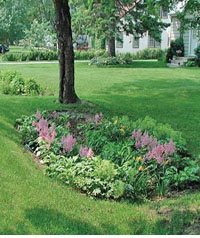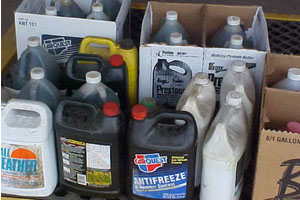
| Resources for Homeowners |
| WHAT YOU NEED TO KNOW: There are many chemicals in a home that can cause stream pollution if they are discarded improperly. Rainfall that runs off your property goes directly to a stream or pond. There is no treatment process to remove stormwater pollutants, so homeowners must control pollution “at its source”. Hard surfaces on your property like driveways and rooftops reduce the amount of porous ground (mainly your lawn and gardens) that absorb rainfall. There are “Low Impact Development” (LID) strategies, such as rain gardens, that can be added to new and existing homes to increase absorption of rainfall and reduce pollutants. |
 |
WHY ARE HOMES CONSIDERED POLLUTION SOURCES?
The greatest reason for stream impairment in Oklahoma is excess bacteria, and urban areas are major contributors. Rooftops collect leaves, bird droppings and dirt which will be washed off with every rainfall. Animal waste from urban pets, birds and wildlife all contribute large amounts of bacteria to streams with every rain event.
 |
Homeowners often over-fertilize lawns and misuse pesticides. It’s important to consider the consequences of improper chemical use and to follow directions carefully. Pouring used motor oil, paints and solvents into stormdrain inlets in streets violates federal and state laws. Homes contain many of the same chemicals that are used in industries. Chemicals in a stormdrain do not go to any treatment plant, they flow directly to creeks and ponds in your neighborhood, often where children play. |
WHAT YOU CAN DO AS A HOMEOWNER:
Vehicle Maintenance
• Recycle used motor oil, antifreeze and car batteries.
• Do not pour chemicals or yard waste into streets or stormdrains.
• Clean up spills immediately, and properly dispose of materials.
Lawn and Garden Care
• Use pesticides and fertilizers sparingly; follow application directions.
• Sweep overcast fertilizer and pesticide pellets back onto lawn.
• Mulch grass clippings. Mulching lessens disposal, and recycles nutrients.
Pet Waste
• While walking your dog, pick up animal droppings with disposable baggies.
• Flush pet waste down the toilet or bury it at least 6 inches deep.
• Use a lawn and pet waste composter for animal waste.
Washing Your Car
• Use phosphate-free, non-petroleum, biodegradable soaps.
• Empty soap buckets on the lawn or in a sink, not into the street.
• Use a commercial car wash to clean the engine and under the car.
De-icing in the Winter
• Don’t apply salt or chemicals in deep snow; deicers are ineffective.
• Sweep up any unused material; use the least amount necessary.
• Reduce salt and other chemicals by adding sand for traction.
